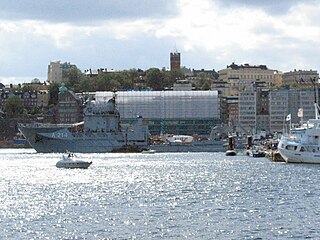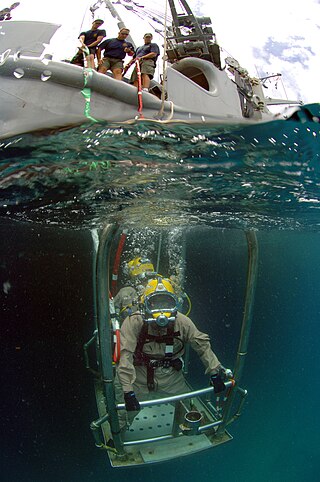
Diving activities are the things people do while diving underwater. People may dive for various reasons, both personal and professional. While a newly qualified recreational diver may dive purely for the experience of diving, most divers have some additional reason for being underwater. Recreational diving is purely for enjoyment and has several specialisations and technical disciplines to provide more scope for varied activities for which specialist training can be offered, such as cave diving, wreck diving, ice diving and deep diving. Several underwater sports are available for exercise and competition.

Police diving is a branch of professional diving carried out by police services. Police divers are usually professional police officers, and may either be employed full-time as divers or as general water police officers, or be volunteers who usually serve in other units but are called in if their diving services are required.
Underwater divers may be employed in any branch of an armed force, including the navy, army, marines, air force and coast guard. Scope of operations includes: search and recovery, search and rescue, hydrographic survey, explosive ordnance disposal, demolition, underwater engineering, salvage, ships husbandry, reconnaissance, infiltration, sabotage, counterifiltration, underwater combat and security.

VRA Rescue NSW (VRA) is an Australian volunteer organisation that provides rescue services to the communities across New South Wales. The first rescue squads formed the Volunteer Rescue Association with the assistance of the New South Wales Police Force. The service is now called VRA Rescue NSW. Groups with common charters can become an affiliate of the Association.

Diver rescue, following an accident, is the process of avoiding or limiting further exposure to diving hazards and bringing a diver to a place of safety. A safe place is often a place where the diver cannot drown, such as a boat or dry land, where first aid can be administered and from which professional medical treatment can be sought. In the context of surface supplied diving, the place of safety for a diver with a decompression obligation is often the diving bell.

Special Tasks and Rescue Group is the Police Tactical Group of the South Australia Police.
The State Protection Group (SPG) is part of the Counter Terrorism & Special Tactics Command of the New South Wales Police Force and was established in 1991 to deal with extraordinary policing responses. The SPG directly supports police in high-risk incidents such as sieges with specialised tactical, negotiation, intelligence and command-support services. The unit also provides rescue and bomb disposal support, canine policing, and armoury services.
In American law enforcement, the Emergency Service Unit, or ESU, is a multi-faceted element within a law enforcement agency’s Special Operations Command.
Canadian Armed Forces (CAF) divers are specialists trained to conduct underwater operations within their respective environmental commands. Divers within the CAF are qualified into sub-categories of diving. Be it a member of a diving team or a CAF member who is maintaining currency and qualification through casual diving. Divers within the CAF are trained as Clearance Divers, Search and Rescue Technicians (SAR), Port Inspection Divers (PID), Ship's Team Divers, and Combat Divers.
A silt out or silt-out is a situation when underwater visibility is rapidly reduced to functional zero by disturbing fine particulate deposits on the bottom or other solid surfaces. This can happen in scuba and surface supplied diving, or in ROV and submersible operations, and is a more serious hazard for scuba diving in penetration situations where the route to the surface may be obscured.

Underwater search and recovery is the process of locating and recovering underwater objects, often by divers, but also by the use of submersibles, remotely operated vehicles and electronic equipment on surface vessels.

Diving equipment is equipment used by underwater divers to make diving activities possible, easier, safer and/or more comfortable. This may be equipment primarily intended for this purpose, or equipment intended for other purposes which is found to be suitable for diving use.
The North West Police Underwater Search & Marine Unit are based in the North West of England, and deliver specialist underwater search, confined space searches and marine policing from the Scottish border to Mid-Wales.

URF is the Royal Swedish Navy’s Submarine Rescue Vessel.

The following outline is provided as an overview of and topical guide to underwater diving:

The following index is provided as an overview of and topical guide to underwater diving:
Underwater work is work done underwater, generally by divers during diving operations, but includes work done underwater by remotely operated vehicles and crewed submersibles.
Diving support equipment is the equipment used to facilitate a diving operation. It is either not taken into the water during the dive, such as the gas panel and compressor, or is not integral to the actual diving, being there to make the dive easier or safer, such as a surface decompression chamber. Some equipment, like a diving stage, is not easily categorised as diving or support equipment, and may be considered as either.
Diving procedures are standardised methods of doing things that are commonly useful while diving that are known to work effectively and acceptably safely. Due to the inherent risks of the environment and the necessity to operate the equipment correctly, both under normal conditions and during incidents where failure to respond appropriately and quickly can have fatal consequences, a set of standard procedures are used in preparation of the equipment, preparation to dive, during the dive if all goes according to plan, after the dive, and in the event of a reasonably foreseeable contingency. Standard procedures are not necessarily the only courses of action that produce a satisfactory outcome, but they are generally those procedures that experiment and experience show to work well and reliably in response to given circumstances. All formal diver training is based on the learning of standard skills and procedures, and in many cases the over-learning of the skills until the procedures can be performed without hesitation even when distracting circumstances exist. Where reasonably practicable, checklists may be used to ensure that preparatory and maintenance procedures are carried out in the correct sequence and that no steps are inadvertently omitted.

A diving team is a group of people who work together to conduct a diving operation. A characteristic of professional diving is the specification for minimum personnel for the diving support team. This typically specifies the minimum number of support team members and their appointed responsibilities in the team based on the circumstances and mode of diving, and the minimum qualifications for specified members of the diving support team. The minimum team requirements may be specified by regulation or code of practice. Some specific appointments within a professional dive team have defined competences and registration may be required.










